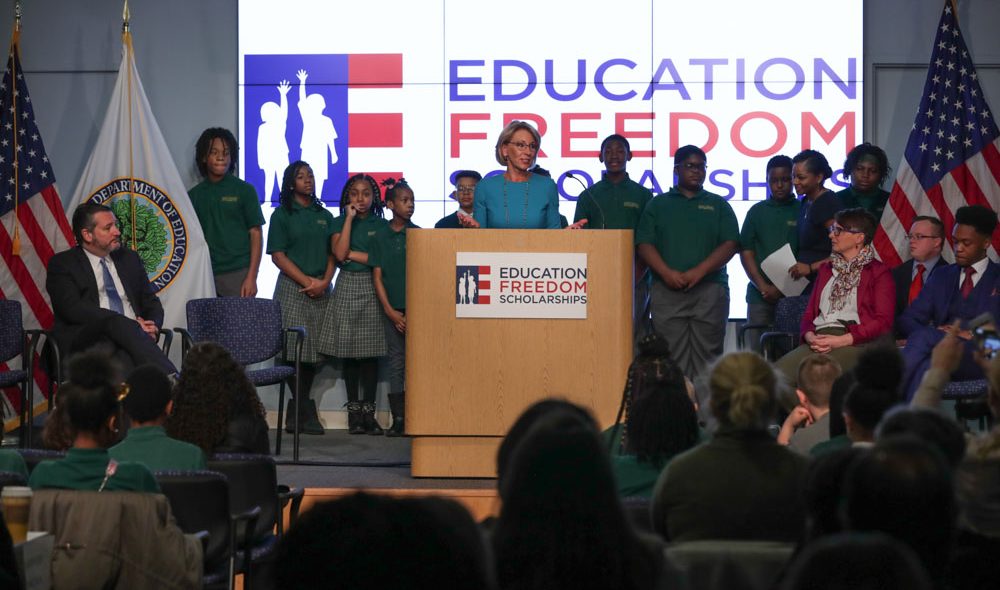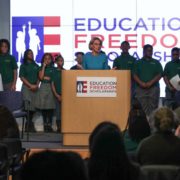
WASHINGTON — On Thursday, February 28, U.S. Secretary of Education Betsy DeVos, along with U.S. Sen. Ted Cruz (R-TX) and U.S. Rep. Bradley Byrne (R-AL), unveiled Education Freedom Scholarships (EFS), the Trump Administration’s key proposal to expand and improve the education options available to students across the country. The policy will make a historic investment in America’s students, injecting up to $5 billion yearly into locally controlled scholarship programs that empower students to choose the learning environment and style that best meets their unique needs. The policy would not rely on any funds currently allocated to public education, nor would it create a new federal education program. Participation would be voluntary for students, schools, and states.
“I believe every student in America deserves the opportunity to pursue the education that best meets his or her needs,” said DeVos. “No student should feel stuck in a school that just isn’t working for them, or feel hopeless because they live on the ‘wrong’ side of town. Education Freedom Scholarships will finally give students the opportunity to learn in places and grow in ways that have too often been denied to them. This historic investment in students honors the fact that each one of them is unique and deserves an education that’s personalized for them, unleashes their creativity, and unlocks their potential.”
EFS will be funded through taxpayers’ voluntary contributions to state-identified Scholarship Granting Organizations (SGOs). Those taxpayers will then receive a non-refundable, dollar-for-dollar federal tax credit. EFS will not create a new federal education program but instead will allow states to decide whether to participate and how to select eligible students, education providers, and allowable education expenses.
“The key element of the proposal is freedom for all involved,” Secretary DeVos added. “Students, families, teachers, schools, states—all can participate, if they choose, and do so in the ways that work best for them. The major shift is that a student’s needs and preferences, not their address or family income, will determine the type and quality of education they can pursue.”
Some of the ways states could potentially expand students’ access to educational opportunities include but are not limited to:
• Advanced, remedial, and elective courses;
• Apprenticeships and industry certifications;
• Concurrent and dual enrollment;
• Private and home education;
• Special education services and therapies;
• Transportation to education providers outside of a family’s zoned school;
• Tutoring, especially for students in low-performing schools; and
• Summer and after-school education programs.
“A quality education is the gateway to the American dream and stable, family-sustaining employment,” Cruz said. “The Education Freedom Scholarships and Opportunity Act will drive increased investment in our students by creating a federal tax credit for taxpayers that donate to scholarship organizations. Our bill enables all students to access a personalized education experience that meets their individual needs by providing access to scholarships for private and home education; apprenticeships, industry certifications, concurrent and dual enrollment; tutoring; educational therapy; after-school education programs; transportation; and more.”
Byrne added, “Every student in America should have the opportunity to receive a high-quality education, and we can help accomplish that goal through a new federal tax credit. This model has succeeded at creating opportunity for students in my home state of Alabama, and I am hopeful through this legislation that we can create similar opportunities for students around the country. I applaud the leadership of President Trump and Secretary DeVos to expand choice and freedom in education, and I am committed to working with them and Sen. Cruz to see this legislation across the finish line.”
For more information on EFS, please visit www.ed.gov/freedom.







